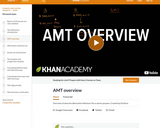
Overview of what the Alternative Minimum Tax is and its purpose. Created by Sal Khan.
- Subject:
- Economics
- Social Science
- Material Type:
- Lesson
- Provider:
- Khan Academy
- Provider Set:
- Khan Academy
- Author:
- Sal Khan
- Date Added:
- 07/25/2012

Overview of what the Alternative Minimum Tax is and its purpose. Created by Sal Khan.

This activity is to help students be creative with some of the content they learn in Financial Literacy. Students will learn about taxes and then take it an extra step by creating a short film about what they learned. This can be used to help other students learn more about the complex tax system. Students can use a classroom video camera or their own device to record and edit.
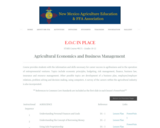
Course provides students with the information and skills necessary for career success in agribusiness and in the operation of entrepreneurial ventures. Topics include economic principles, budgeting, risk management, finance, business law, insurance and resource management. Other possible topics are development of a business plan, employee/employer relations, problem solving and decision making, using computers. A survey of the careers within the agricultural industry is also incorporated. ** References to Common Core Standards are included as the first slide in each lesson's PowerPoint**
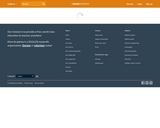
The basics of the alternative minimum tax. Created by Sal Khan.
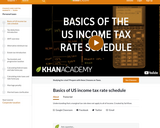
Understanding that a marginal tax rate does not apply to all of income. Created by Sal Khan.

Students match tax types to definitions and then apply their knowledge to tax scenarios.
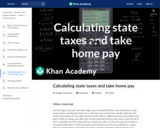
How to calculate state taxes and take-home pay.Created by Sal Khan.
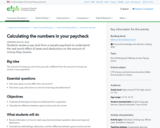
Students review a pay stub from a sample paycheck to understand the real-world effect of taxes and deductions on the amount of money they receive.
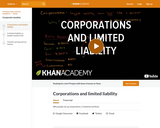
Why people set up corporations. Created by Sal Khan.
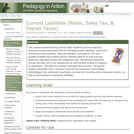
Problem based accounting learning activity for notes and interest payable, sales tax payable, and payroll.
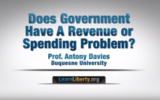
People say the government has a debt problem, but what causes federal government debt? In this video, Professor Antony Davies of Duquesne University traces the root cause of government debt to find out if the problem is too much spending or too little government tax revenue.

Students will comprehend their paycheck, the voluntary and compulsory withholding of income, basic payroll concepts, and explanations of tax documentation.

We keep hearing that the wealthy pay a disproportionate share of our taxes. Do the rich pay too much tax? We can't answer that question without looking at how income is distributed. It turns out that tax payments are unequal because income is unequal. Even if we taxed everyone at exactly the same rate, the rich would still have huge tax payments - because they're the ones making the most income.
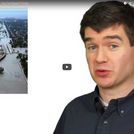
What are the two biggest threats facing future generations? The growing Federal debt, and climate change. The national debt will trash the economy, and global warming will trash the planet. But economics offers a solution to BOTH problems: a carbon tax. So why do economists cry themselves to sleep?
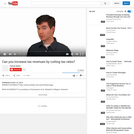
Can the government actually increase tax revenues by cutting tax rates? A lot of politicians - and even some economists - seem to think so. The idea is that the tax cut will spur so much economic growth that tax revenues increase despite the lower rate. It's an idea known to economists as the Laffer Curve. But is that true? EconGuy looks at the numbers, and then at recent U.S. experience with tax cuts, tax increases, and revenues.
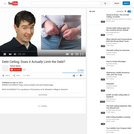
What is the debt ceiling that we keep hearing about? For that matter, what is the federal debt, where does it come from, and how big is it? Does the debt limit actually limit the debt? What would happen if Congress failed to raise the debt ceiling? And what does the debt limit have to do with tight pants?
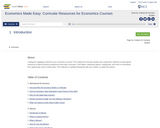
Looking for engaging content for your economics courses? The Institute for Humane Studies has curated this collection of educational resources to help economics professors enrich their curriculum. Find videos, interactive games, reading lists, and more on everything from opportunity costs to trade policy. This collection is updated frequently with new content, so watch this space!
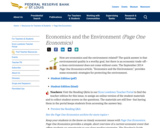
How are economics and the environment related? The quick answer is that environmental quality is a worthy goal, but there is an economic trade-off: a clean environment does not come without costs. The September 2014 Page One Economics article, "Economics and the Environment, "provides some economic strategies for protecting the environment.
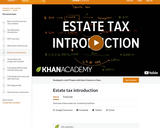
Overview of the estate tax. Created by Sal Khan.
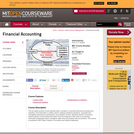
This six-week summer course teaches basic concepts of corporate financial accounting and reporting. This information is widely used in making investment decisions, corporate and managerial performance assessment, and valuation of firms. Students perform economics-based analysis of accounting information from the viewpoint of the users of accounting information (especially senior managers) rather than the preparer (the accountant). This course is restricted to MIT Sloan Fellows in Innovation and Global Leadership.